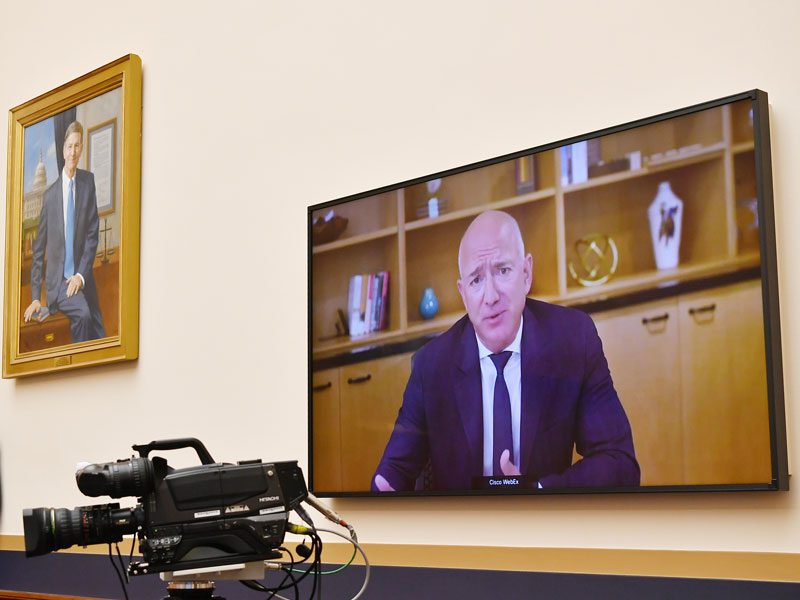Top 5 most important takeaways from the US antitrust probe into big tech
The New Economy takes a look at the most significant accusations made against the CEOs of Facebook, Google, Amazon and Apple during the US Congressional committee’s historic hearing

Amazon CEO Jeff Bezos testifies before the House Judiciary Subcommittee on Antitrust, 29th July, Washington DC
On 29 July, the CEOs of Facebook, Google, Amazon and Apple testified in front of the US House of Representatives’ Antitrust Subcommittee. It was a highly anticipated event, and with good reason: the appearance of one tech leader in front of the US Congressional committee is newsworthy enough, but this was the first time that all four CEOs had attended a hearing together.
The committee’s investigation was launched to determine whether the companies have engaged in anticompetitive practices. Ultimately, it could help inform new laws to regulate tech companies and protect consumers.
Because of social distancing measures, the four CEOs appeared in front of lawmakers over videoconferencing. According to Reuters, Amazon CEO Jeff Bezos seemed “the least fazed”, despite it being his first congressional hearing, whereas Zuckerberg stumbled over his words when presented with compromising internal emails.
The CEOs gave patriotic defences of their companies, arguing they had created new ecosystems for start-ups and ultimately boosted, not harmed, competition. “Just like the world needs small companies,” said Bezos, “it also needs large ones.” But lawmakers had a different perspective, accusing the firms of abusing their market dominance to steamroll the competition. The New Economy takes a look at the most significant moments from the hearing.
Facebook’s acquisition of Instagram
Facebook CEO Mark Zuckerberg came under fire for the company’s purchasing of social media platform Instagram. The committee used internal documents to argue that this was a deliberate attempt to crush a rival company. In an email exchange from March 2012, a senior employee at Facebook described how the founders of Chinese company RenRen found success because they were “copying other people”; the employee went on to suggest that Facebook should use the same strategy. An internal document also showed that Zuckerberg, before Instagram’s acquisition, said Facebook “could just buy any competitive start-ups”. However, he insisted that the company did not view Instagram as a competitor at the time.
Amazon stealing data
US Representative Pamila Jayapal, a Washington Democrat, asked whether Amazon took data from vendors on the platform and used it to create its own products. In April 2020, a Wall Street Journal investigation found that Amazon had indeed used data about independent sellers to develop private-label merchandise.
Responding to repeated questions about the investigation’s findings, Bezos said that while there is a policy against this practice, he “couldn’t guarantee” it hadn’t been violated before. He also confirmed lawmakers’ suspicions that the practices remained unaddressed when he said, “I’m not satisfied that we have gotten to the bottom of it, and we’ll keep looking at it.”
Apple discriminating against apps
Unlike the other companies in the hearing, Apple was not accused of stifling the competition. Instead, it came under fire for allegedly discriminating against apps on its platform. Documents showed that Apple had made exceptions to its own rules regarding commission structure, striking a special deal over the Amazon Prime Video app for iOS and Apple TV. Other documents revealed that Apple had considered raising commissions to 40 percent for the first year for subscription apps. Although this never materialised, the email exchange raises questions over whether Apple was adhering to its own rules.
Amazon crushing the competition
Amazon was accused of using monopolistic tactics to squeeze smaller players out of the retail market. For example, internal documents suggested that Amazon had used aggressive price-cutting to force Diapers.com out of business. Another document showed that Amazon also took on losses of $200m during this period, possibly because it knew the smaller business wouldn’t be able to compete at this scale. Email exchanges seemed to confirm that this was a commonly used strategy by the company. Of Amazon’s purchase of smart home company Ring, Bezos himself said in an email, “we’re buying market position – not technology. And that market position and momentum is very valuable.”
Google manipulating search results
Google CEO Sundar Pichai was questioned over the company’s 2007 acquisition of adtech platform DoubleClick. Despite having promised lawmakers that it would not merge DoubleClick data with Google account data, the company did exactly that in June 2016, giving itself the power to more precisely profile and target users. Lawmakers accused Google of “effectively destroying anonymity on the internet” with this decision.
At the same time, the antitrust committee accused Google of using its “surveillance over web traffic” to identify competitors and delist them from its search results. However, Pichai said that its search engine only blocks out websites to “comply with law”.













